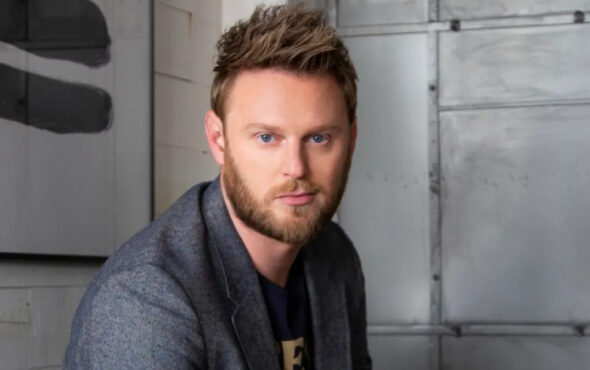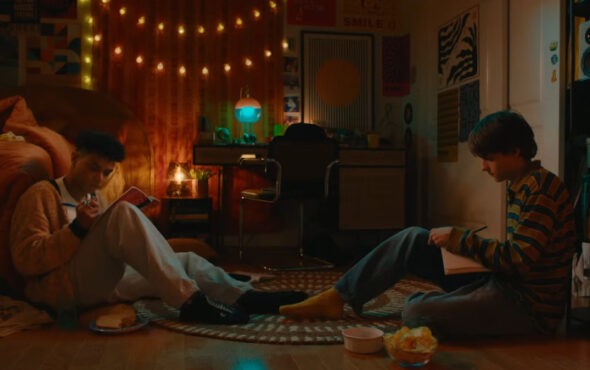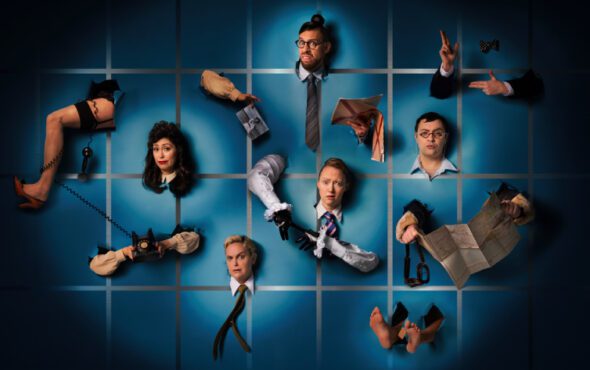
Ah, Operation Mincemeat. We adore this show: we reviewed the Southwark Playhouse run in 2021, the Riverside Studios production in 2022, and we checked out the West End opening earlier this year, awarding each performance a perfect 5/5. Shortly before the West End premiere, we took an opportunity to interview SpitLip, the creative team who put the show together and nurtured it over several years, taking it from an early incarnation as a two-song scratch production at the Lowry in Salford, through to the glitzy West End show that’s recently been extended to February 2024.
Following the announcement of the extension we popped back to the Fortune Theatre to see the show again, this time catching two of the understudies – Holly Sumpton and Christian Andrews – covering brilliantly for Natasha Hodgson and Jak Malone. We also took an opportunity to chat with David Cumming, who is part of the creative team SpitLip (alongside Natasha Hodgson, Zoe Roberts and Felix Hagan). David stars in Operation Mincemeat – a madcap comedy musical set during the Second World War – in the role of Charles Cholmondeley, a scientist working at MI5 who is the chief architect of the titular operation.
As we’re all no doubt familiar with, chatting via Zoom affords a fun little sneaky peek inside peoples’ flats, and a neon sign in the background catches our attention – does it say ‘slay’? “It says ‘slay’, but unfortunately it looks a bit like ‘slag’! I suppose either is accurate,” David quips. “It was my friends’ present to me for getting on to the West End, they clubbed together to get me a sign which says ‘slay’ which was nice.”
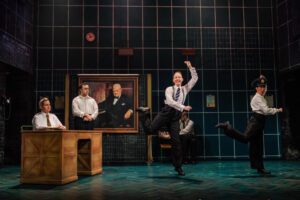
When we last spoke, Operation Mincemeat was just about to open for previews on the West End – how have the last six months been? “Great! And eye-opening, we’re living in this dream that’s gone better than we could possibly have hoped for. It’s so nice to see the reaction people have had to the show, the way that it’s growing and getting more known… on the flip side, it’s a lot of work, it’s tiring, it’s exhausting. You’re on this treadmill that you can never get off, and it keeps extending – it would be remiss of us not to say it’s a hard show to keep doing, but the joy that it brings to people is such a gift.
“Lots of people say, ‘life’s really tough right now’, and that coming to the show gives them a bit of a reprieve from that… also, hearing people from the queer community saying that it feels like it represents them in some way, it’s a really lovely thing to hear and also quite an interesting development in the show, as we never set out to do that. But it seems as though that’s baked in as part of what the show means to people now.”
We can attest to that: it’s a joyous musical that we’ll gladly watch again and again – we have done! – and also one that’s presented in a subtly queer way. On the subject of queer theatre, a number of the summer’s biggest shows in London – from A Little Life to Brokeback Mountain, from A Strange Loop to La Cage aux Folles – have been queer shows, more specifically focusing on the lives of gay men. It could be argued that there are a lot of specifically gay plays at the moment and maybe we don’t need so many…
“Representation is always important! There are many different people in the world and to not reflect that in our art is ignoring the multiplicity of experiences that there are, to be human. So representation is always needed, for a thriving society. In terms of queer theatre, I think it’s a really interesting moment in queer art and queer theatre. You’re quite right that there are a lot of gay plays on, I think it’s interesting that we use the term ‘gay play’ because I think that speaks somewhat to the focus of those shows.
“It’s great seeing shows like Brokeback Mountain on, and A Little Life, really great that we have that representation. I’d say those shows are queer in their subject matter, but aren’t queer in their viewpoint, or lens. It’s important to think of a differentiation between what the show’s about – queer subject matter, or gay lives – and what the worldview is that the show is presenting. I would argue that those shows play into the straight narrative of queer lives, the stories of difficulty of queer experiences, or they’re about trauma, like “oh gosh, it’s difficult being gay”. That is absolutely true, but there are other stories to be told.
“I’ve not yet seen La Cage but I hear that it is a new modern queer take, that it’s celebrating queerness and difference, not just the white gay male experience. And I think something like A Strange Loop is very interesting, it’s so good that a story of black queer life is being put on at big stages like The Barbican, that’s huge! It’s important because the queer experience isn’t a monolith, we don’t all have the same life, we don’t all have the same view point! Venues that are like ‘hey, we’ve got our queer show for the year’… that’s one voice, so we’re never going to hear many different stories.”
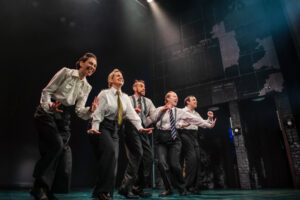
David was a guest artistic director at The King’s Head, the LGBTQ+ pub theatre in Islington, earlier this year – how was that experience? “The work I’ve been doing at the King’s Head Theatre was the first time I was curating a season and finding work… the first time I was in charge of gatekeeping, and that was a really interesting process, and part of what was interesting was trying to find work that spoke from queers to queers.
“Those conversations are just so much further ahead than the mainstream parlance of what can be talked about on stages, so the West End is always going to be a bit behind the curve, it’s not ever going to be the forefront, it’s never going to be pushing the boundaries too much, because it can’t. Those conversations haven’t got into the mainstream enough to hit those stages, and I don’t know whether producers feel confident enough that stories like that could sell. I reckon they probably could, if we made space for them.”
On the back of this comment we had a discussion about A Strange Loop and why it was so important – because the questions it posed felt like the conversations we could be having today, they didn’t feel like questions the queer community was asking itself 10 or 20 years ago. As enjoyable as chatting about queer theatre is, we’re here to talk with David about Operation Mincemeat – if we could maybe get back on track…
Last time we spoke, David described Operation Mincemeat as a ‘quietly queer’ show – we’re intrigued to understand more about what he meant by that. “Harking back to what I said before, in terms of subject matter versus lens… ostensibly there isn’t anything in the show about queer lives or the queer experience. The subject matter isn’t queer itself, it’s not a gay play. The presentation queers the telling of the story, but that isn’t the point of the show. It so happens that the way we’ve cast it, the way we’ve orchestrated it for those voices, means that the queerness is baked in: it’s not referenced, and crucially it’s not the crux of the joke.
“The crux of the joke of Monty’s character is not that it’s played by a woman, the crux of the joke of Hester’s character is not that she’s played by a man – those characters are standalone and would be fine to be played by a man and a woman respectively. But it’s a lot more interesting if you flip that, because it opens a door to a conversation and leaves it open throughout the whole show, and then people go away and have their own conversations about what they just saw.
“There’s no preaching about respecting people’s gender identity, no-one can come out saying ‘oh they bludgeoned us over the head with the queer agenda’ – we didn’t, we just presented the show as it was, but you’re going to go away thinking ‘I watched a woman playing a man for the whole time and I completely believed it’… it’s already make believe, so it’s not much of a further step to say ‘this person’s a man for the purpose of the next few hours’. It’s great for women to get a chance to take up that much space on a stage – to be obnoxious! – to reflect back that patriarchy and masculinity are learnt behaviours.”
On that note, we asked David whether he’d seen the Barbie Movie, which explores a similar narrative theme about patriarchy being a learned behaviour: one that Ken sees playing out one day and decides to copy. Surprisingly, he hasn’t – although we guess being in a West End show doesn’t allow much in the way of free evenings. Anyway, back to Operation Mincemeat…
“When you see the scene where Monty [an arrogant naval intelligence officer] is chastising Jean [a secretary], and saying ‘you’re only good for making the tea’, it reads so much more strongly when it’s not a man saying it. You realise it’s just the voice of a social construct that’s playing out in front of you, and it’s not a comment on men, it’s a comment on how we allow people to be in the world, and that masculinity and therefore femininity are performances.
“Equally so, having someone who doesn’t identify as female playing Hester [an office clerk], it’s very rare to see a male body sitting in vulnerability and loss without then moving into anger or revenge, or something that is usually more masc-coded. Really it’s just a man showing love, and the loss of that love. That is so rare to see, particularly on stage.” In our review of the musical, we described Hester’s tender ballad, ‘Dear Bill’, as ‘the West End’s most unexpected showstopper’ – it truly is a special moment in the show.
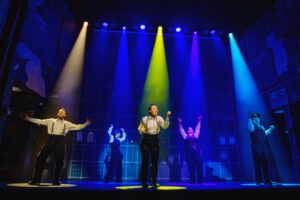
Photo: Matt Crockett
David spoke to us about how the show is opening conversations for audience members. “One messaged us saying that they’ve taken their 70+ year old father to this show, and he’s the kind of person who doesn’t quite know what words to use any more, and finds that confusing, and he left the show being like ‘oh I loved the gender-blind casting, I thought that was so interesting and clever’. Another messaged us saying ‘my father didn’t feel like he’d been preached to, that no-one was taking a polemic position like you’re old and you’re wrong, it was just like – welcome to the world, it could be like this.’
“I think we need both versions of our art, one that is smashing every system, in-your-face queer work that is speaking to queer people, that is ahead of the normal conversation, really pushing boundaries. And we need other stuff that is raising questions in a different way, and I think this show is a really great opportunity to do that.”
So is it important to David that Operation Mincemeat has a queer angle? “We never actually set out to make a piece of queer theatre, it’s just baked into the way that we work. We cast whoever is best in the role, or whoever is funniest, regardless of gender. As a queer person, it is important that I am representing, and making space for people to feel as though they are accepted.
“One of the things people talk about is ‘I Wish I Was a Maggot’, or ‘Dead in the Water’ is the name of the song. People have said it feels like a queer – or a trans – anthem to them! It’s a song about wanting to be… other. That one day you will reach this transformative stage, where people will see you in the way that you want to be seen. People are latching on to that, and having lyrics tattooed on their bodies, to remind them that the way they see themselves is their truest self. So it feels like people are coming to the show and adding new levels of queer joy into the show, which is a wonderful experience.”
We had a little look at David’s Twitter feed and saw posts about the trials and tribulations of dating, now that he’s in a West End show. We were wondering how life is different, now that Operation Mincemeat has become such a success? “Apart from Claire, none of us have done a long-running show before. You’re used to working in chunks, then going back to having your days free to be writing, so it’s very different to be on this endlessly-growing treadmill! Nobody’s having a bad time, but you just don’t have much time to really exist outside of your show.
“You’re the thing that people go to on a date! So when do you go on a date? Everything’s shut and done. On the flip, side I’m on the West End and the show’s going well and people say really nice things about me! It’s interesting, thinking about the future of the show, we’ve kinda completed the West End dream, and now we’re like… what next?” Well, what is next? Nothing is yet announced, but it sounds like conversations are happening about tours or international transfers.
This would be an exciting development – although it would, of course, have implications for the performers in the show. “It’s a terrible analogy, but it feels like we’ve given birth to this big galumphing baby and we forgot to cut the umbilical cord,” David says. “So all four of us in SpitLip are being dragged through the world by this big baby that’s just enjoying itself, so wherever the show goes we’re tied to it! We don’t want to leave it alone, but it has a mind of its own, it’s in the lap of the gods now.” It is a somewhat disconcerting image, this giant baby trampling all over the world. “Welcome to my brain!”
The show has developed a cult following, who have nicknamed themselves the ‘Mincefluencers’ – what is it that keeps people coming back? “It’s a place of joy and fun and safety, it’s a classic story of the underdog trying to achieve something. But I think what people love about it, is that it’s five people on stage, being silly and free and giving ourselves over to the audience’s enjoyment. People pick up on that, and I think they fall in love with these characters, they leave feeling ‘these are my five friends who I watched for a bit and I’m part of their gang’ and we let them in, there’s a bit of fourth wall breaking, we’re self-aware that the audience are there.
“Every night you feel like you’re on this special journey with these five people, and the audience latch on to that – it’s nice to spend a couple of hours with pals, watching them be fun… and of course that’s all part of the artifice, but the truth is that it is five people on stage having a silly time and trying to make you laugh. And it’s got banging songs in it which you can’t get out of your head! People talk about it being their happy place, which is really nice. They want to come here, forget about everything else and just enjoy themselves with their pals for a couple of hours. That’s such a nice gift to have given to people.”
Operation Mincemeat plays at the Fortune Theatre until 24th February 2024. More information can be found here.


